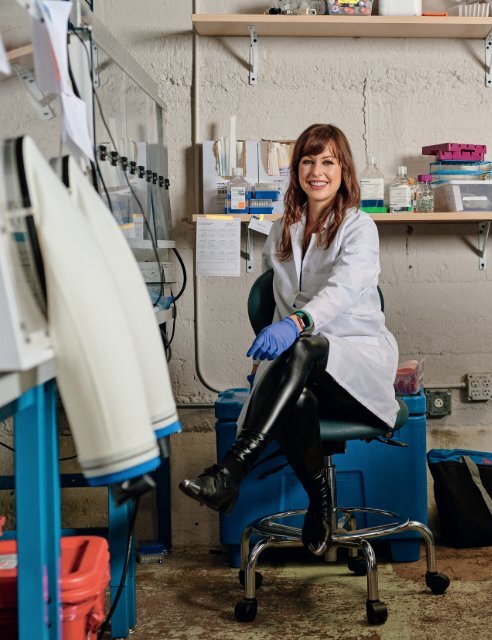Land Rover Magazine Issue 40
In this issue, new Defender is put through its paces by two inspirational young adventurers as they prepare for an expedition to the South Pole. We also celebrate 50 years of Range Rover by taking a journey of discovery to Dubai. As well as looking back, we look to future as a group of visionaries explain the technologies that could change the future for all of us.
In this issue, new Defender is put through its paces by two inspirational young adventurers as they prepare for an expedition to the South Pole. We also celebrate 50 years of Range Rover by taking a journey of discovery to Dubai. As well as looking back, we look to future as a group of visionaries explain the technologies that could change the future for all of us.
Create successful ePaper yourself
Turn your PDF publications into a flip-book with our unique Google optimized e-Paper software.
PHOTOGRAPHY: MATHEW SCOTT<br />
I<br />
f you want to cure a<br />
disease, you first have<br />
to understand a disease.<br />
But how can you hope<br />
to know everything<br />
about it when the<br />
information is<br />
distributed across thousands of medical<br />
journals published over 50 years? It’s too<br />
much for any human to process. But artificial<br />
intelligence can now offer an answer.<br />
Medical research entrepreneur Katharina<br />
Volz is building a computer super-brain<br />
that can support human researchers by<br />
processing the vast amount of research data<br />
on a disease to suggest links and solutions<br />
that humans might never have spotted.<br />
Volz is CEO of San Francisco-based<br />
OccamzRazor, a company founded to help<br />
find a cure for Parkinson’s, a complex<br />
neurodegenerative disease that affects more<br />
than ten million people across the world.<br />
After graduating from Harvard Medical<br />
School and getting a PhD from Stanford, Volz<br />
was set to follow an academic career. But, in<br />
2016, she received a call from someone close<br />
who had been diagnosed with Parkinson’s.<br />
“I was devastated,” she says. “I made a<br />
resolution that I was going to find a cure.”<br />
Eighty per cent of all the information in<br />
biomedicine is in medical publications and<br />
clinical documents. In order to start her<br />
search, Volz had to build a new technology<br />
that was able to understand these scientific<br />
papers to help formulate better hypotheses.<br />
“Parkinson’s is a poorly understood<br />
disease,” she explains. “Patients develop<br />
different symptoms – tremors, loss of sense of<br />
smell, balance problems. We need to bring<br />
together information from disparate areas like<br />
genomics, proteomics and metabolomics.<br />
It is too complex for humans to grasp<br />
“I MADE A RESOLUTION THAT<br />
I WAS GOING TO FIND A CURE<br />
FOR PARKINSON’S DISEASE”<br />
MEDICAL ARTIFICIAL INTELLIGENCE<br />
KATHARINA VOLZ<br />
CEO, OCCAMZRAZOR<br />
everything involved.” So Volz and her<br />
small team of machine-learning experts,<br />
biomedical scientists and computational<br />
biologists started by identifying the hundreds<br />
of key phrases to do with the disease, before<br />
working with the AI lab at Stanford University<br />
to develop a machine learning system that<br />
could ‘understand’ the papers.<br />
“We developed a natural languageprocessing<br />
algorithm that could identify<br />
various elements as well as their biological<br />
relationships,” explains Volz. Human<br />
Parkinsome, as the system is now known, is<br />
ten times faster than a human doing the same<br />
job and just as accurate. “We’ve now fed more<br />
than 20 million scientific papers through the<br />
system and, as soon as a new paper gets<br />
published, it’s immediately ingested into our<br />
system,” says Volz. Researchers can query the<br />
suggested hypotheses and feed the results<br />
back in, making the system smarter.<br />
Now that an AI brain has been developed<br />
to understand Parkinson’s, the team can apply<br />
the same technology to other diseases. “The<br />
platform is built in such a<br />
way that we can plug in data<br />
for cancer, for Alzheimer’s,<br />
for any complex biological<br />
disease,” says Volz. While<br />
these are early days, she is<br />
ambitious about changing<br />
the way we do medical<br />
research: “It’s ridiculous<br />
that email software is more<br />
intelligent than the software<br />
we use to find cures for<br />
diseases. But I feel hugely<br />
optimistic. My motto is:<br />
‘Everything is possible’.”<br />
49















